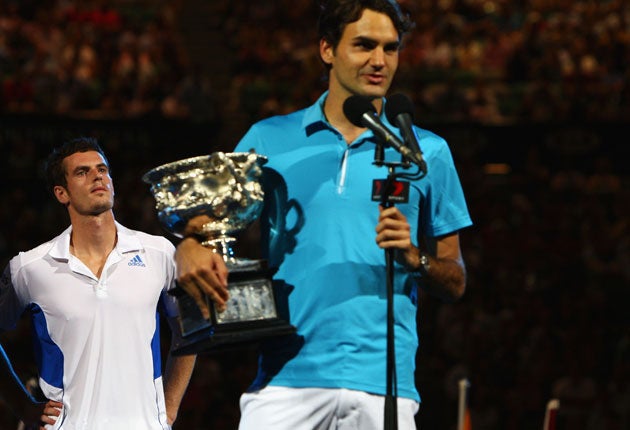Brian Viner: Murray needs to find the extraordinary to finally come out of big three's shadow
The Way I See It: Part of the beauty of sport is that it is full of surprises, a carnival of the unpredictable

Andy Murray has the misfortune for a proud and exceptionally talented sportsman of knowing in his heart of hearts that, to win that coveted, elusive Grand Slam title, he must rely less on his own form than the form of others.
Hurricane Irene permitting, the US Open will start at Flushing Meadows today with Murray the form horse, having won the recent Cincinatti Masters in which Novak Djokovic, Rafa Nadal and Roger Federer all competed. With that in mind, no less a judge than John McEnroe, who won four US Opens, is telling folk that he thinks this is Murray's best chance yet of winning a Slam. McEnroe believes that the Scotsman, a former junior champion at Flushing Meadows, can "feed off the energy" of the famously boisterous New York crowd to go one better than he did in 2008, when Federer beat him in straight sets.
The bookmakers, however, disagree. Murray was rated an 11-2 chance yesterday, behind five-times champion Federer (5-1), defending champ Nadal (7-2) and 6-4 favourite Djovokic. No less pertinently, Murray disagrees too. He has described McEnroe's words as "silly" – which in the New Yorker's own backyard amounts to proper lese-majeste. "Whether it's my best chance or not, no-one has a clue," he responded. "It will be 'Federer is not playing well and Rafa is struggling and Djokovic's shoulder is sore'. But I know come Monday they'll all be fine. Especially towards the latter stages, when you're playing against maybe the three greatest players ever, you're going to have to play an incredible event to win. I feel like I'm ready to do that. But to say it's my best chance, no-one knows."
In playing down his optimism, Murray unwittingly offered a definition of his entire career so far. The word "incredible", from the Latin incredibilis, is defined by my dictionary as "so extraordinary as to seem impossible". That is the level he needs to reach, while uncomfortably aware that when he meets any one of "maybe the three greatest players ever", he will win only if his opponent is playing below his best. The gloomy truth is that Murray's incredible is not as good as Djokovic's, Nadal's or Federer's optimum. He knows that he probably triumphed at Cincinnati only because Djokovic withdrew.
As for Federer, the Swiss maestro is now the wrong side of 30 and slipping, however slowly or grudgingly, from the mountain-top. Pete Sampras won only one of his 14 Grand Slam titles – the 2002 US Open – after his 30th birthday. So with nobody making a particularly speedy ascent behind him, Murray should at some point in the next year or two move up from number four in the world to number three. He has been world number three before, and even, fleetingly, number two. But tennis is like golf in that world rankings don't matter half as much as major championships. In common with Luke Donald and Lee Westwood, Murray would swap any place in the league table for some serious silverware.
He is 24 now. Will he ever be a superior player to Nadal or Djokovic, respectively a year older and a week younger? To do so, either he has to get substantially better or they have to get worse, and neither seems especially likely. Brilliant sportsmen can improve, of course. The great sprinter Harold Abrahams felt he couldn't run any quicker until the coach Sam Mussabini told him he could find him another couple of yards, at least if Chariots of Fire is to be believed. And who five years ago would have tipped Ireland's amiable splay-footed golfer Padraig Harrington to win three majors?
Besides, part of the beauty of sport is that it is full of surprises, a carnival of the unpredictable, so only a seer or a fool would write off Murray's chances of hanging up his racket with one or more Grand Slams in his locker. But throbbing in him like a cartoon headache, I shouldn't wonder, is the realisation that as very, very good as he is at propelling a tennis ball over a net, he is not quite, never has been and more than likely never will be, as good as the very best.
Something, therefore, has to change. It would be a crying shame if Britain's best male tennis player since the 1930s, and quite possibly Britain's best male tennis player until the 2030s, or even the 2130s, fails to land a single Grand Slam title. So, if Murray is never going to find the repertoire of shots to overwhelm Djokovic or Nadal in a Grand Slam final, he has to build the mental strength. It isn't at all easy in any sporting arena, and maybe least of all on a tennis court, to trump physical supremacy with a clearer, stronger mindset. But again, it can be done. Long ago, Muhammad Ali even managed it in a Kinshasa boxing ring.
So, the way I see it, Murray needs to stop talking about how fantastic Federer, Nadal and Djokovic are. Never mind all that stuff about them being perhaps the three greatest tennis players ever, because all that does is underline his own bad timing, having been born into altogether the wrong era. He won't win a Grand Slam until he gets the psychology right, then backs it up it by playing tennis so extraordinary as to seem impossible.
Subscribe to Independent Premium to bookmark this article
Want to bookmark your favourite articles and stories to read or reference later? Start your Independent Premium subscription today.

Join our commenting forum
Join thought-provoking conversations, follow other Independent readers and see their replies